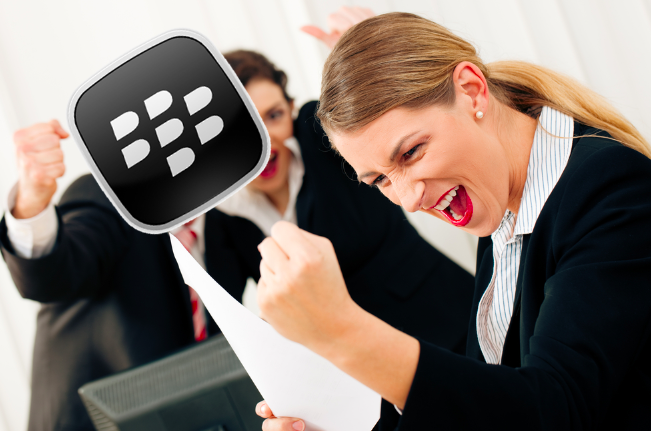Sadly, it’s just not happening for BlackBerry.
The company that once almost invented the smartphone revolution hemorrhaged 81 percent of its market share in April, and in the latest Kantar Worldpanel results, dropped another 63 percent just this past month. Now the board has put the company up for sale — a quick sale. It wants the deal done by November.
Perhaps the timing is right, given that Microsoft just picked up another struggling phone company, or at least its handset assets, earlier this week. But the board has been looking for “strategic alternatives” for a month, and potential buyers are not necessarily knocking down the door.
Disappointing sales of the company’s recent Z10 and Q10 may have been the last straw, but the trend was clear many months ago … if not years. And when you can’t even bring yourself to mention your primary competitor’s name one single time, things are definitely bad.
This chart says it all. From similar beginnings five years ago, Apple and Google have soared as iOS and Android have taken over the mobile markets, while BlackBerry has lost almost 100 percent of its value:
However, the Waterloo, Ontario-based company does have one thing going for it: a massive patent goldmine in the increasingly litigious smartphone market. While its dwindling smartphone business might not have any significant enterprise value, its 5,300 patents and 3,700 pending patent applications certainly cover many key aspects of mobile communications and smartphone features.
Last month, Scotiabank estimated those patents could be worth $2.25 billion, although other estimates put the figure as high as $5 billion.
Potential buyers could include companies that are currently building smartphones and want to strengthen their patent portfolios, such as Lenovo or Samsung, or even a Google or Apple. Given Apple’s history, though, it would be much more likely to engage in some kind of patent-licensing deal that would protect it from future litigation but avoid the entanglements and hassle of a major acquisition.
There is some good news in the fall of the once-giant phone maker.
BlackBerry’s hometown of Waterloo is a smallish city of under 100,000 an hour or so from Toronto, but it was home to 500 startups in 2012 — many of them fueled by former BlackBerry personnel who left as the company downsized, or as they saw its prospects for success dim.
“Waterloo and the culture of startups there is because of RIM,” John Marshall, the president and CEO of the Ontario Capital Growth Corporation told me when I visited four months ago. “You’ve got kids coming up who saw their parents do it.”
In other words, the high-tech workforce shed by a downsizing BlackBerry is feeding the founding and growth of small startups in tech’s never-ending cycle of creative destruction. It’s painful and it’s harsh, but it’s also necessary and results in new growth.
VentureBeat's mission is to be a digital town square for technical decision-makers to gain knowledge about transformative enterprise technology and transact. Learn More






